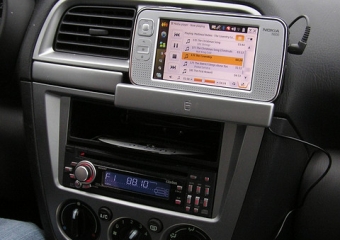

Photo by Alan Bruce is licensed under CC BY 2.0
It’s almost impossible to find a governmental entity that is not struggling with revenue shortfalls. And as a result, public officials everywhere are trying to find places where budget cuts can be made. There is, however, a danger in this type of thinking. All too often, when the need to cut is imminent, reductions are made quickly and without a lot of thought in areas that actually may have the potential to save money and make government more efficient.
Fleet service is an area that is always in danger of budget cuts. Recently, a number of states announced fleet reductions of 10 percent or more as a way to bridge budget gaps. It seems that this is a popular thing to do. Unfortunately, this is also the type of budget cut that often turns into a two-edged sword…and an option that is not good for taxpayers.
Here’s an example. GPS fleet management systems are certainly not a necessity and it is easy to discount any discussions of installing them when budget reductions are mandatory. But, the systems are known to produce a good return on investment within six months of implementation. Government is the second largest industry for GPS fleet management systems yet the general public does not really understand the value proposition.
Early users of GPS systems were commercial fleets and law enforcement agencies, but now cities and states have started to embrace them – and for good reason. Data shows that driving a few miles over the lawful speed limit results in lower fuel efficiency and idling vehicle motors drive up costs significantly. Driving behavior has a tremendous impact on fuel costs.
With a GPS fleet management program, vehicle information is recorded and then used to encourage drivers to move from one stop to another more efficiently, without wasting time – and fuel – while idling. The data also allows government officials to track public vehicles after hours to ensure there is no unauthorized use.
Companies hired to increase efficiencies in either the public or the private sectors are quick to point out that behavior of employees is the most critical element of cost control. Guidelines must be developed, stated and then measured. GPS fleet management systems make that possible.
In Texas, the city of Pampa installed GPS systems in its Public Works vehicles. Officials reported immediate results. Idle times were reduced and fuel savings results were $9,000 in the first year. Augusta, Georgia, installed a GPS fleet-tracking system and motor vehicle accidents involving city’s employees at fault decreased by almost 30 percent during the first 12 months alone. The same type results were realized by the town of Islip in New York State. During the first year that a GPS management system was installed, fuel usage from May through July was down approximately 14,000 gallons from the same three months the previous year – a savings to the city of more than $32,000.
GPS tracking systems are but one example of savings that can be realized if public officials are encouraged to be visionary rather than cost cutting zealots who look only to slash budgets. It is important for public employees to exhibit leadership and not simply to maintain the “status quo.”
While some public entities are making significant spending cuts, others are diligently searching for ways to spend money that will result in great ROIs. Surely that is what taxpayers want most.
Have an innovative plan that will result high ROI? Contact us today and we can help guide you through the complex government procurement process.
